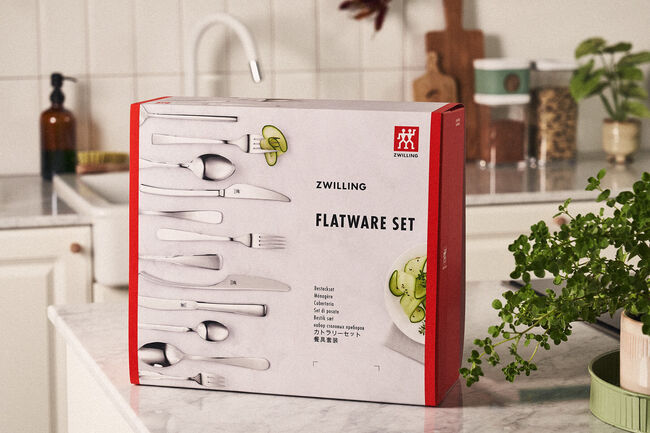
Sustainable products and packaging
For nearly 300 years, our products have been synonymous with quality, durability, and innovation. We remain committed to constantly evolving, especially in the field of sustainability. Whether through CO2 savings in production, using sustainable resources, or plastic-free packaging, we are focused on making our production more sustainable. Our goal is to produce all our products in a more environmentally friendly way by 2030 so you can cook more sustainably.
The most important figures at a glance





Producing more sustainably. Sustainability is an important issue that requires long-term solutions. Our goal is to make all our products carbon-neutral by 2030. To achieve this, we will consider ecological principles more during the planning and design phase of product and packaging development. We also want to minimize the environmental impact along the product life cycle. Specialists in eco-design, life cycle analysis, FSC certification, and environmental compliance are working together to make our product range climate-friendly.
Our focus:
- Increased recycling and reuse of materials
- Reducing our consumption of finite resources
- Systematic reduction of carbon emissions
- Creating a shared knowledge base for ecological product development
Thinking ecology right from the start

One of our most important goals is to reduce carbon emissions throughout the life cycle of our products. The first step in achieving this is using Life Cycle Assessments (LCA) to determine where the CO2 hotspots are in our value creation process.
In 2022, we used LCA screenings to collect precise data on the carbon footprint of our ZWILLING Four Star knife series. The study was conducted in a supervised audit by DEKRA. We can use the knowledge gained from this project to improve the sustainability of other product ranges.

An analysis of the Four Star knives revealed that raw materials, especially steel, comprise the largest part of the knife’s carbon footprint at 47%, followed by the manufacturing process at 36%. With this data, we can now take targeted action.
Our first measures:
- We will switch the knife handles to at least 75% recycled plastic. This allows us to save valuable raw materials while maintaining the same quality. We can also significantly reduce CO2 emissions by using secondary materials.
- Packaging will be plastic-free in the future (except for the blade protection cover) and made from starch and FSC-certified paper.
- By switching to renewable energy sources at our Solingen production site, we save 3,109 tons of greenhouse gas emissions annually.

In addition to metal, we use a lot of wood in our products. To become more sustainable, we use FSC®-certified wood for most of our wood-based products. The ZWILLING J.A. Henckels AG, ZWILLING J.A. Henckels Europa GmbH, and our UK subsidiary are the first companies in the ZWILLING Group to be FSC®-certified (license code: FSC®-C-182665). In the future, all new knife blocks entering the market in Germany will be offered with certified FSC®-wood.
The next step is to include our other subsidiaries in the FSC® certification process. This will pave the way for us to obtain 100% of the wood we use from sustainable sources by 2030.
Our sustainable products
Your account will be deleted!
Notify me when available
This field is required








